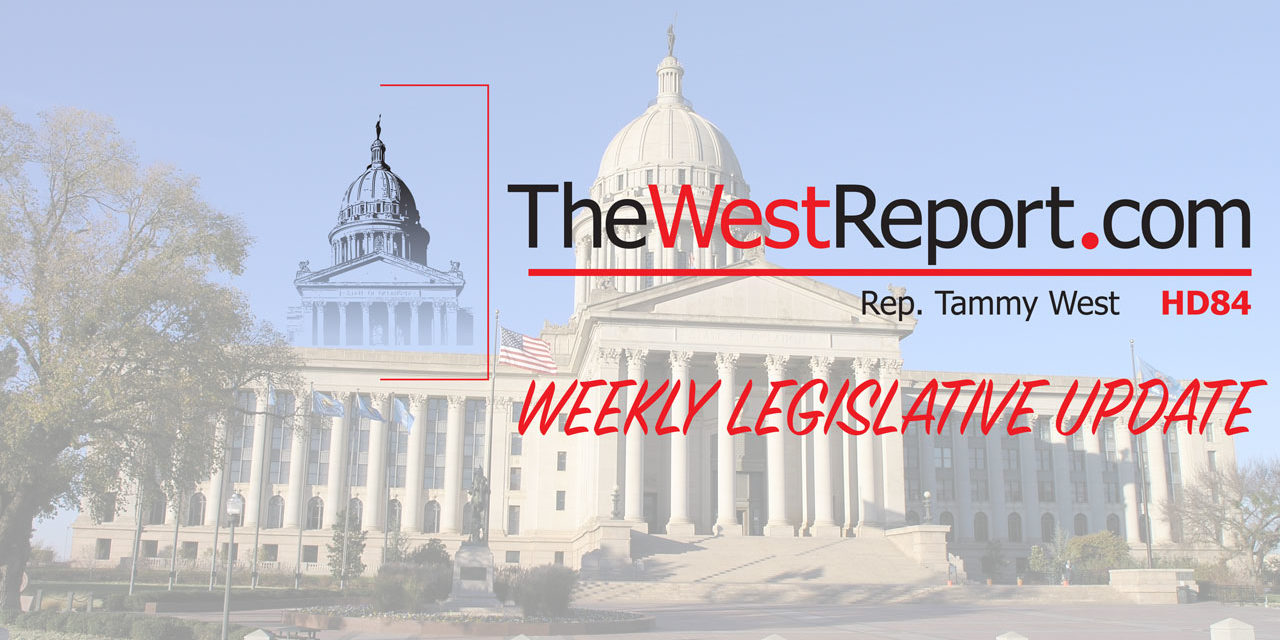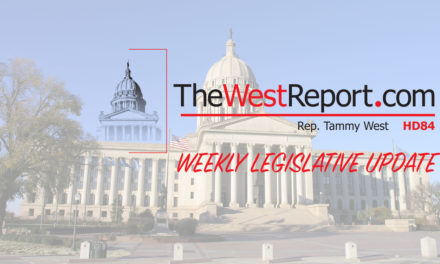Fiscal Year 2019 Budget Heads to Governor’s Desk
Members of the Oklahoma House and Senate this week passed Senate Bill 1600, the general appropriations bill for Fiscal Year 2019. The budget totals more than $7.6 billion, a nearly 11 percent increase over the adjusted budget for Fiscal Year 2018. Of the appropriations, education will receive 51 percent, or $3.86 billion. The general appropriations bill also includes additional allocations to the Health Care Authority for graduate medical schools, $34 million for the Pinnacle Plan and $4 million to help communities with losses from the recent wildfires. The House passed SB 1600 with a vote of 63-31. It now proceeds to Gov. Mary Fallin’s desk.
Legislature Completes Deadline
House and Senate on Thursday both met the legislative deadline for bills and resolutions to be passed out of the opposite chamber. The conference committee process, for those bills not yet approved by the chamber of origin, has been taking place for several weeks and is expected to wrap up next week to allow for an early adjournment of the Legislature.
Governor Mary Fallin Signs Criminal Justice Reform Bills
OKLAHOMA CITY – Governor Mary Fallin today signed seven criminal justice reform bills that will reduce the flow of nonviolent offenders into prison; establish a more efficient and streamlined parole process; and facilitate successful reentry that reduces recidivism.
The governor signed the following measures:
- Senate Bill (SB) 650, which authorizes no more than one nonviolent felony to apply for expungement if they have no new convictions or pending charges within the last seven years.
- SB 786, which eliminates the mandatory minimum and allow a judge to sentence up to the current maximum sentence of seven years in prison for burglary in the second degree, and would create a new felony offense, burglary in the third degree (defined as breaking into a vehicle), punishable by up to five years in prison.
- SB 649, which reduces enhanced sentences for certain repeat nonviolent felonies.
- SB 689, which creates risk and needs assessment as a tool for sentencing.
- SB 793, which changes the penalties for commercial drug offenses, and distinguishes conduct by possession with intent to distribute, distribution, and manufacturing.
- House Bill (HB) 2281, which adjusts penalties for numerous low-level property offenses, including larceny, forgery and other “paper crimes.”
- HB 2286, which creates an administrative parole process for nonviolent offenders who comply with case plans in prison so that the Pardon and Parole Board can focus on more serious offenders, and would establish a geriatric parole release process for inmates who are 60 and older and who have been determined to not be a public safety risk.
Fallin Signs Bill Legalizing Hemp Pilot Program
OKLAHOMA CITY – Gov. Mary Fallin signed legislation today increasing Oklahoma’s agricultural options by creating the Industrial Hemp Agricultural Pilot Program.
House Bill 2913 by Rep. Mickey Dollens, Majority Floor Leader Jon Echols and state Sen. Lonnie Paxton allows Oklahoma farmers to plant and harvest hemp. The Oklahoma Department of Agriculture, Food, and Forestry will manage the program, which permits universities to work with farmers in Oklahoma to cultivate certified hemp seed for research and development for industrial uses.
Through the Agricultural Act of 2014, the federal government enabled states to begin growing hemp as a cash crop for limited purposes. Industrial hemp programs currently exist in nearly 40 other states.
HB 2913 creates within the Oklahoma Department of Agriculture, Food, and Forestry a revolving fund that will consist of all registration, lab, and inspection fees paid by program participants.
Because the bill includes an emergency clause, the legislation takes effect immediately.
Governor Mary Fallin Signs Bill Linking Public Assistance Recipients with Career, Technology Education Programs
OKLAHOMA CITY – Governor Mary Fallin today signed legislation that links Temporary Assistance for Needy Families (TANF) recipients with career and technology education and training programs.
House Bill (HB) 2825 by Representative Scott McEachin and Senate Majority Whip Nathan Dahm, is a measure requested by the governor. It is part of a suite of bills related to employment, training, and education client engagement for recipients of public assistance programs.
HB 2825 directs the Department of Human Services to explore opportunities to enhance community partnerships for the purpose of linking TANF recipients with career and technology education and training programs. This will expand opportunities for TANF recipients to participate in and complete employment and training activities.
HB 2825 takes effect Nov. 1.
TANF is a federal program designed to help needy families achieve self-sufficiency. States receive block grants to design and operate programs that accomplish one of the purposes of the TANF program: provide assistance to needy families so that children can be cared for in their own homes; reduce the dependency of needy parents by promoting job preparation, work and marriage; prevent and reduce the incidence of out-of-wedlock pregnancies; and encourage the formation and maintenance of two-parent families.
Constitutional Carry Bill Clears House
OKLAHOMA CITY – State Rep. Sean Roberts, R-Hominy, issued the following statement today following the House passage of Senate Bill 1212. The measure allows any person at least 21 years of age or a person who is at least 18 years of age and in the military to carry a firearm concealed or unconcealed if the person is not otherwise disqualified from the possession or purchase of a firearm. The amendment excludes persons convicted of certain crimes from carrying a firearm. Roberts is the House author of the legislation, which passed the chamber with a vote of 59-28. It now goes back to the Senate to accept House amendments.
“The right for law-abiding citizens to openly carry firearms already exists in the United States Constitution – it’s called the Second Amendment. It’s time we put a stop to bureaucratic roadblocks that infringe on these rights and instead codify a citizen’s ability to carry a firearm. Oklahoma prides itself on being a state that values individual freedoms, yet we’ve put red tape between people and their basic rights. With today’s House passage of Senate Bill 1212, we’re one step closer to rectifying that problem. I’m thankful for my colleagues’ support.”
New Driver’s Manual Information Aims To Assist With Police Encounters
OKLAHOMA CITY – The Oklahoma Driver’s Manual will now include a “What to Do and Expect When Stopped by Law Enforcement” insert, following conversations between the Oklahoma Legislative Black Caucus (OLBC) and the Oklahoma Department of Public Safety (DPS). The additional information is designed to better prepare citizens for interactions with members of law enforcement.
“What to Do and Expect When Stopped By Law Enforcement” outlines information on how citizens can help encounters with law enforcement end positively. It also includes information on steps citizens can take if treated inappropriately by a law enforcement officer.
Opioid measures get approval in Senate
OKLAHOMA CITY – On Wednesday, the Senate approved legislation to slow the rapid growth of opioid addiction in Oklahoma. Sen. A.J. Griffin is the Senate author of House Bill 2798 that creates the Opioid Overdose Fatality Review Board and House Bill 2931 to require the use of electronic prescribing for all scheduled drugs.
Under HB 2798, the Board will conduct case reviews of opioid overdose deaths of individuals 18 years or older; collect, analyze and interpret state and local data on opioid deaths; and develop a state and local database on those deaths. The Board will submit an annual statistical report on the incidences and causes of the opioid overdose deaths it has reviewed including recommendations for the medical and law enforcement system.
HB 2931 exempts licensed veterinarians, practitioners who experience temporary technological or electrical failure or other extenuating circumstance that prevents the prescription from being transmitted electronically, a practitioner, other than a pharmacist, who dispenses directly to an ultimate user, a practitioner who orders a controlled dangerous substance to be administered in a state-certified and recognized hospital, nursing home, hospice facility, a practitioner who writes a prescription to be dispensed by a pharmacy located on federal property, or a prescriber that has received a waiver or extension from the Oklahoma State Bureau of Narcotics and Dangerous Drugs Control. The measure provides circumstances under which electronic prescriptions are not to be used. It provides that a Schedule V controlled substance may not be filled or refilled more than five times after the date of the prescription. The measure also delays the effective date of the requirements for electronic prescribing depending on county population.
The bills, which now return to the House for final approval, were among the eight legislative recommendations made by the Oklahoma Commission on Opioid Abuse that Griffin created through legislation in 2016.





